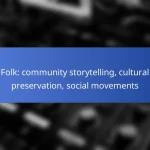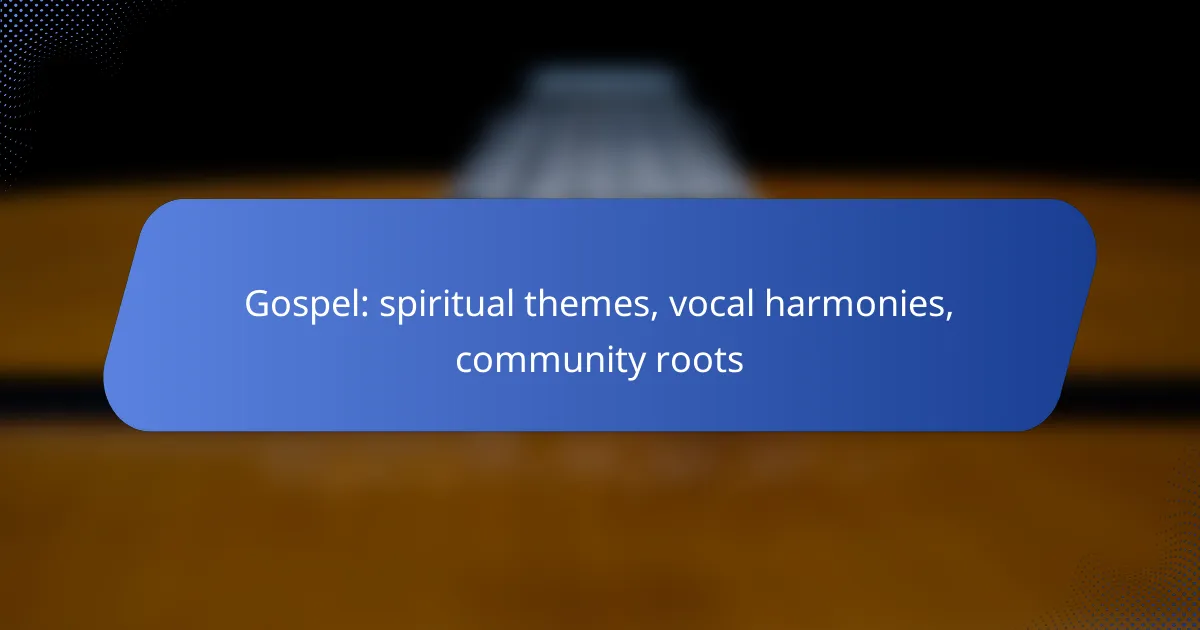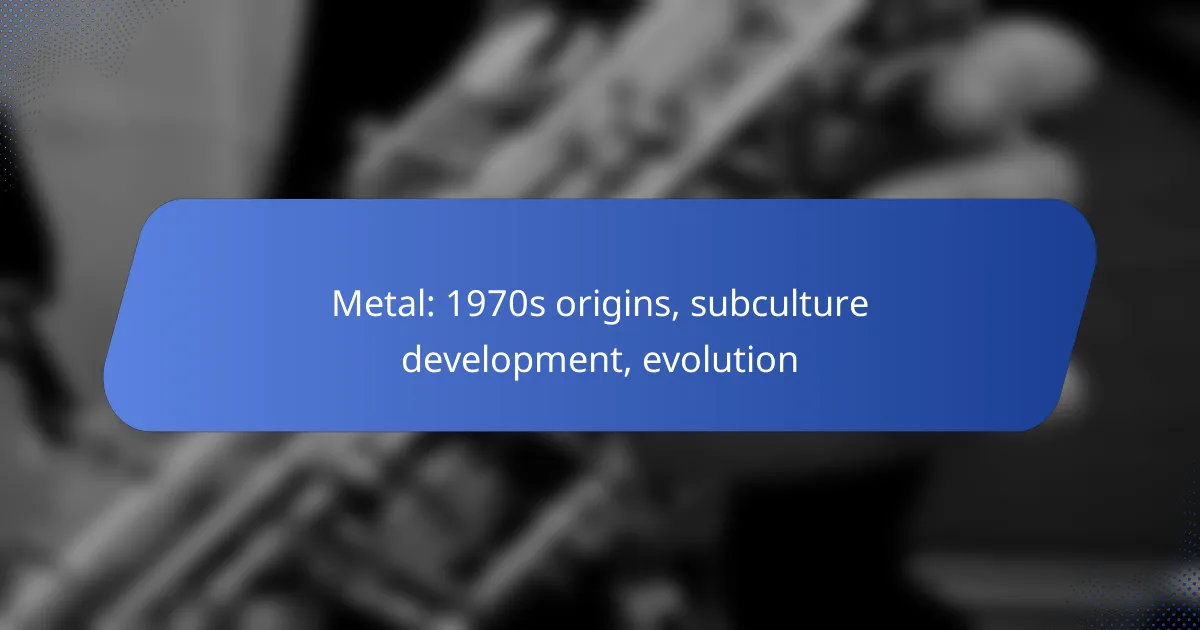Gospel music in Australia is a vibrant expression of community roots, bringing people together through shared spiritual beliefs and cultural heritage. With key themes of faith, hope, redemption, and love, it resonates deeply within diverse communities, reflecting their collective experiences. The rich vocal harmonies characteristic of Gospel music enhance this spiritual experience, fostering emotional connection and communal participation during worship.
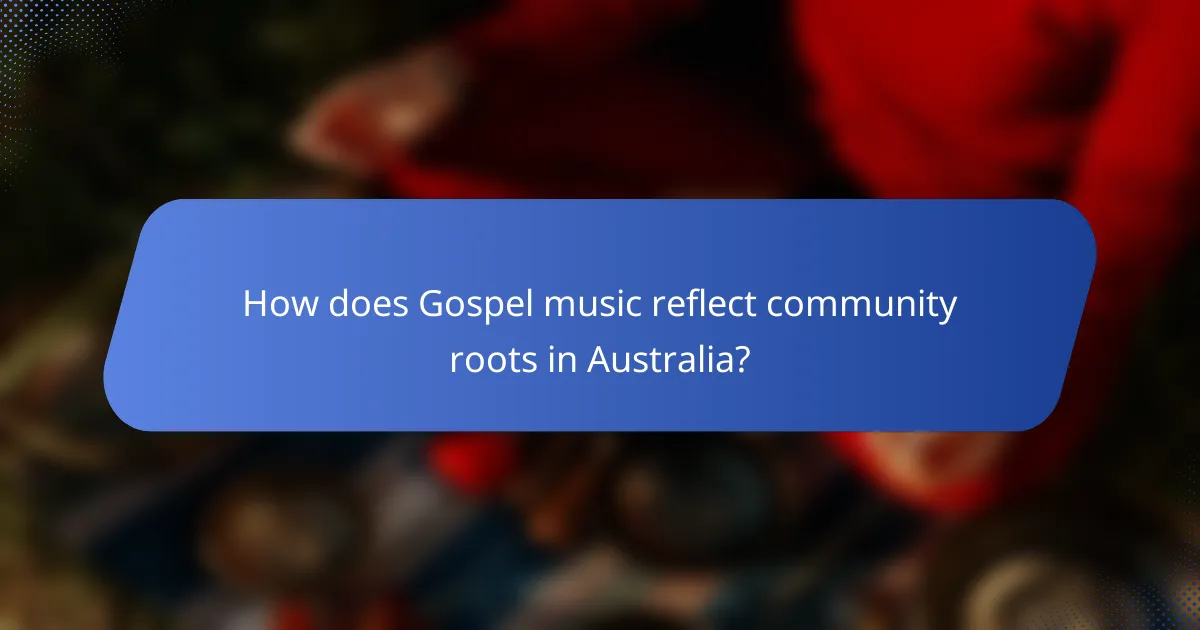
How does Gospel music reflect community roots in Australia?
Gospel music in Australia serves as a powerful expression of community roots, uniting individuals through shared spiritual beliefs and cultural heritage. It fosters a sense of belonging and identity, particularly among Indigenous and multicultural communities, by celebrating collective experiences and values.
Historical significance of Gospel in Australian communities
The historical significance of Gospel music in Australia can be traced back to the arrival of missionaries and the influence of African American spirituals. These musical traditions were adapted by Indigenous Australians and other communities, creating a unique blend that reflects local stories and struggles.
Gospel music has played a crucial role in social movements, particularly during the civil rights era, inspiring Australian activists to advocate for equality and justice. This legacy continues to resonate, as Gospel remains a vital part of community gatherings and celebrations.
Role of Gospel in cultural identity
Gospel music is integral to the cultural identity of many Australian communities, particularly among Indigenous peoples and migrants. It serves as a means of preserving cultural narratives and traditions, allowing individuals to connect with their heritage while embracing contemporary influences.
Through its rich vocal harmonies and emotive storytelling, Gospel music fosters a sense of pride and belonging. It encourages participation across generations, ensuring that cultural practices are passed down and celebrated within families and communities.
Community events and gatherings
Community events and gatherings often feature Gospel music as a central element, bringing people together for worship, celebration, and fellowship. These events can range from church services to festivals, where local choirs and musicians showcase their talents and share their faith.
Participation in Gospel music events promotes social cohesion and strengthens community ties. Engaging in these gatherings allows individuals to experience the joy of collective singing and connection, reinforcing the importance of community roots in Australian society.
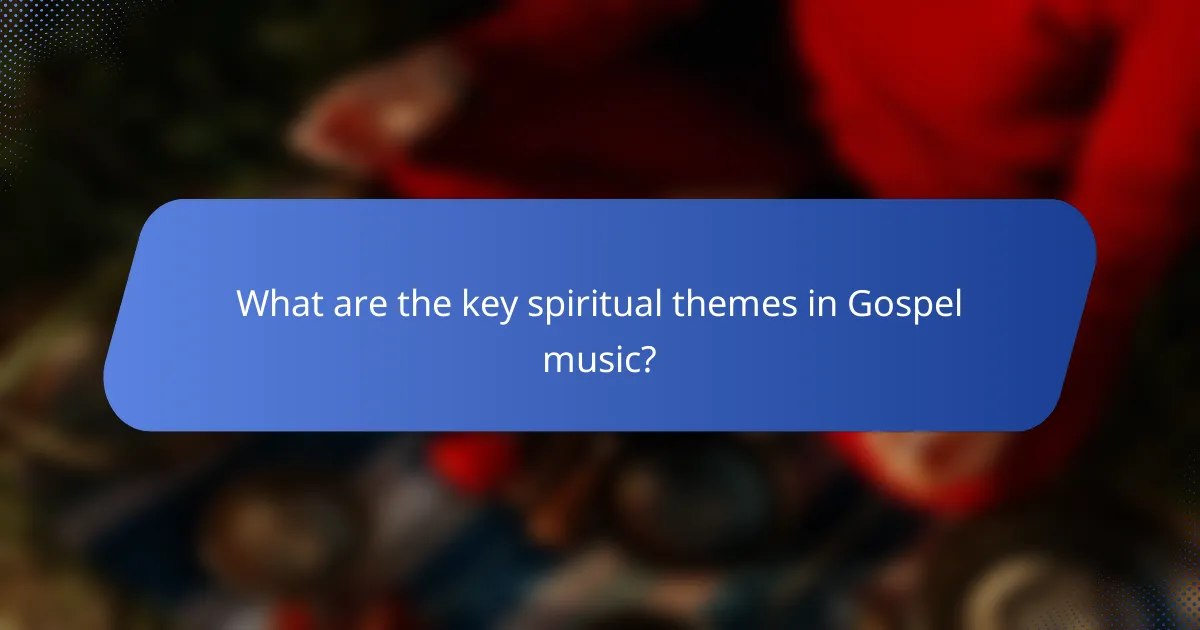
What are the key spiritual themes in Gospel music?
The key spiritual themes in Gospel music include faith, hope, redemption, and love. These themes resonate deeply within the community, often reflecting personal and collective experiences of struggle and triumph.
Faith and hope
Faith and hope are foundational themes in Gospel music, often expressed through lyrics that encourage listeners to trust in a higher power. Songs frequently highlight the belief that faith can lead to positive change, inspiring individuals to persevere through life’s challenges.
For example, many Gospel songs feature narratives of overcoming adversity, reinforcing the idea that hope can be found even in difficult circumstances. This theme is particularly relevant in communities facing social and economic hardships, where music serves as a source of strength and encouragement.
Redemption and salvation
Redemption and salvation are central to the message of Gospel music, emphasizing the transformative power of faith. Many songs tell stories of personal redemption, illustrating how individuals can find forgiveness and a new path through spiritual awakening.
This theme resonates with listeners who seek healing and renewal, often reflecting the belief that no one is beyond saving. Gospel music provides a platform for expressing these experiences, fostering a sense of community among those who share similar journeys.
Love and compassion
Love and compassion are prominent themes in Gospel music, highlighting the importance of caring for one another. Lyrics often promote messages of unity, encouraging listeners to extend kindness and support to their neighbors.
In many Gospel songs, love is portrayed as a divine force that binds individuals together, fostering a sense of belonging within the community. This theme not only uplifts spirits but also serves as a reminder of the shared human experience, reinforcing the idea that love can conquer division and strife.
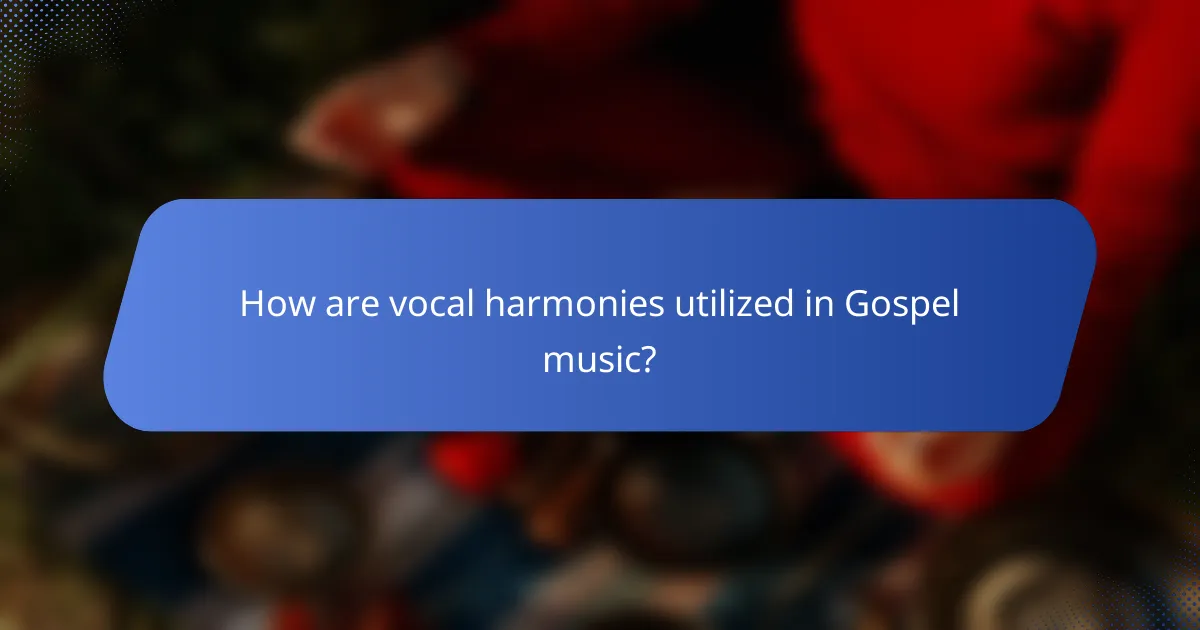
How are vocal harmonies utilized in Gospel music?
Vocal harmonies in Gospel music are essential for creating rich, uplifting soundscapes that enhance the spiritual experience. These harmonies often involve multiple vocal parts that blend together, allowing for emotional expression and communal participation during worship.
Types of vocal arrangements
Gospel music features various vocal arrangements, including unison singing, two-part harmonies, and more complex multi-part harmonies. Unison singing brings a powerful, unified sound, while two-part harmonies introduce a simple yet effective layering of voices. Multi-part arrangements can involve three or more vocal lines, creating a fuller and more intricate sound.
Common arrangements include SATB (Soprano, Alto, Tenor, Bass) configurations, which are frequently used in church choirs. Each voice part contributes to the overall harmony, allowing for a dynamic interplay that enhances the emotional depth of the music.
Influence of call-and-response techniques
Call-and-response techniques are a hallmark of Gospel music, where a leader sings a phrase (the call) and the congregation or choir responds. This interaction not only fosters community engagement but also enhances the harmonic structure by allowing voices to layer in response to one another.
This technique often encourages improvisation, where singers add their own vocal embellishments, creating unique harmonies that can vary from performance to performance. The back-and-forth nature of call-and-response enriches the overall sound and invites participation from the audience.
Role of choirs in harmony
Choirs play a pivotal role in the harmony of Gospel music, often serving as the backbone of vocal arrangements. They bring together diverse voices, allowing for a range of harmonies that can evoke powerful emotions. Choirs typically rehearse regularly to master complex arrangements and ensure cohesive sound during performances.
In many churches, choirs are integral to worship services, leading congregational singing and enhancing the spiritual atmosphere. Their ability to blend voices effectively creates a sense of unity and collective worship, making the experience more impactful for all participants.

What are the benefits of participating in Gospel music?
Participating in Gospel music offers numerous benefits, including emotional and spiritual upliftment, community building, and opportunities for artistic expression. Engaging in this genre can enhance personal well-being while fostering connections among participants.
Emotional and spiritual upliftment
Gospel music is known for its powerful emotional and spiritual impact. The uplifting lyrics and harmonious melodies often evoke feelings of joy, hope, and inspiration. Many participants report a sense of peace and fulfillment after singing or listening to Gospel music, which can contribute to overall mental well-being.
The communal aspect of Gospel music also enhances its uplifting qualities. Singing together in a group can create a shared emotional experience, reinforcing feelings of belonging and support among participants. This collective engagement can be particularly healing during challenging times.
Community building and connection
Gospel music plays a vital role in fostering community connections. Churches and local organizations often host Gospel choirs and events, bringing together individuals from diverse backgrounds. This shared musical experience helps to strengthen bonds and create a sense of unity among participants.
Moreover, Gospel music events often serve as social gatherings, allowing people to meet new friends and deepen existing relationships. Engaging in these communal activities can lead to lasting friendships and a stronger support network within the community.
Opportunities for artistic expression
Participating in Gospel music provides ample opportunities for artistic expression. Singers can explore their vocal abilities while interpreting powerful messages through song. This genre encourages creativity, allowing individuals to experiment with different styles and harmonies.
Additionally, Gospel music often invites collaboration among musicians, songwriters, and vocalists. This collaborative environment can lead to the creation of original compositions and arrangements, further enriching the artistic experience. Engaging in Gospel music can be a fulfilling way to express one’s faith and creativity simultaneously.

How can one get involved in the Gospel music scene in Australia?
Getting involved in the Gospel music scene in Australia can be achieved through various avenues such as joining local choirs, attending festivals, and participating in workshops. These activities not only enhance your musical skills but also connect you with a vibrant community passionate about Gospel music.
Joining local choirs and groups
Joining local choirs and groups is one of the most effective ways to immerse yourself in the Gospel music scene. Many cities across Australia have community choirs that welcome singers of all skill levels, often focusing on vocal harmonies and spiritual themes. Look for groups affiliated with churches or community centers, as they frequently hold auditions or open rehearsals.
Consider participating in weekly practices and performances, which can help you develop your vocal abilities and deepen your understanding of Gospel music. Websites like Meetup or local Facebook groups can be great resources for finding these choirs.
Attending Gospel music festivals
Attending Gospel music festivals is an excellent way to experience the genre’s rich culture and community spirit. Australia hosts several festivals throughout the year, featuring performances from local and international artists. Events like the Australian Gospel Music Festival in Toowoomba provide opportunities to enjoy live music and connect with fellow enthusiasts.
When attending these festivals, take advantage of workshops and seminars offered by experienced musicians. This not only enhances your skills but also allows you to network with others who share your passion for Gospel music.
Participating in workshops and events
Participating in workshops and events is crucial for anyone looking to deepen their involvement in the Gospel music scene. Many organizations and churches offer workshops that focus on vocal techniques, songwriting, and performance skills. These sessions can range from a few hours to several days, providing intensive learning experiences.
Keep an eye on local community boards or online platforms for announcements about upcoming workshops. Engaging in these events not only improves your musical abilities but also fosters connections with experienced artists and fellow participants, enriching your understanding of Gospel music.
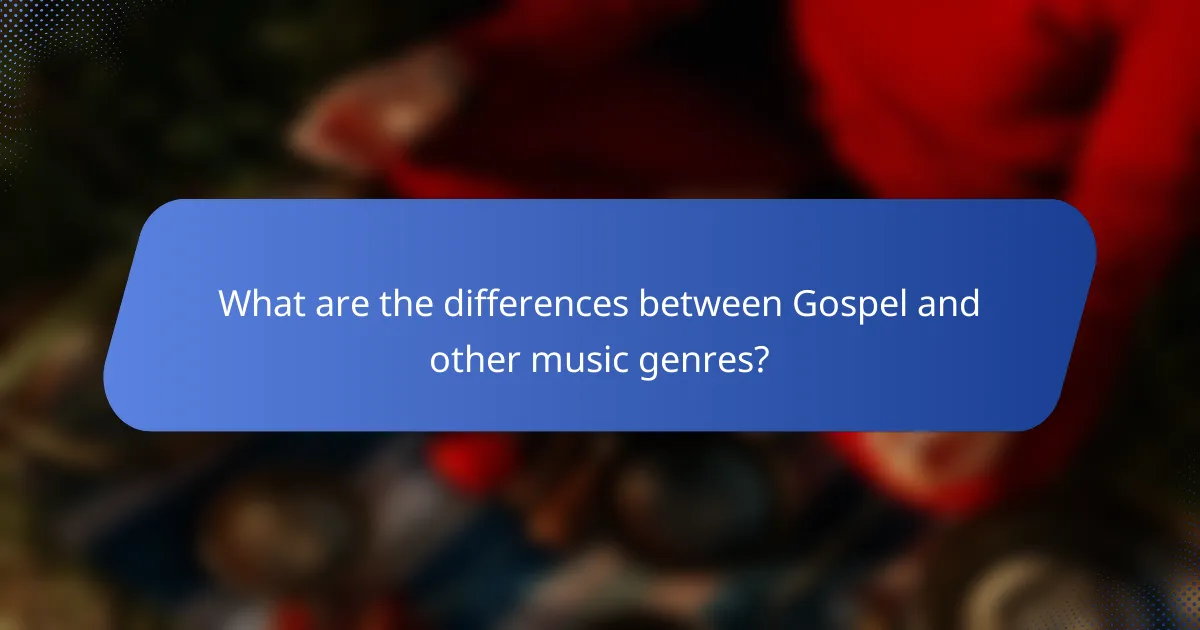
What are the differences between Gospel and other music genres?
Gospel music is distinct from other genres due to its spiritual themes, vocal harmonies, and strong community roots. While many music styles focus on various subjects, Gospel centers on faith, worship, and the Christian experience.
Spiritual Themes
Gospel music is characterized by its deep spiritual themes, often reflecting messages of hope, redemption, and divine love. Lyrics typically draw from biblical stories and teachings, aiming to inspire and uplift listeners. This focus on spirituality sets Gospel apart from genres like pop or rock, which may explore a broader range of topics.
Vocal Harmonies
Vocal harmonies in Gospel music are a hallmark of the genre, often featuring rich, layered arrangements that enhance emotional expression. Singers frequently use call-and-response techniques, engaging the congregation and creating a communal experience. This contrasts with many other genres, where vocal arrangements may prioritize solo performances or simpler harmonies.
Community Roots
The community roots of Gospel music are deeply embedded in its history, originating from African American spirituals and church traditions. Gospel serves as a unifying force, bringing people together for worship and celebration. Unlike genres that may focus on individual success or fame, Gospel emphasizes collective participation and shared faith experiences.




